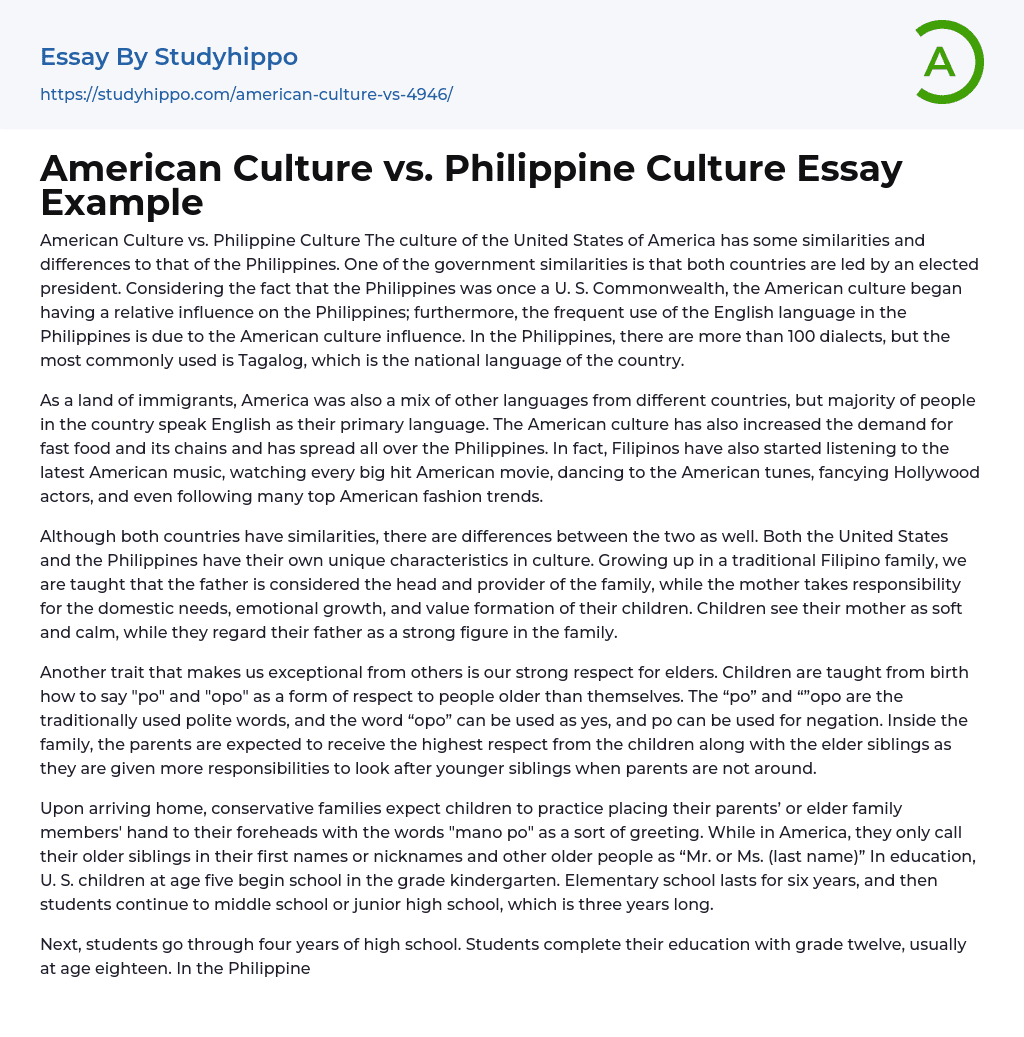American Culture vs. Philippine Culture The culture of the United States of America has some similarities and differences to that of the Philippines. One of the government similarities is that both countries are led by an elected president. Considering the fact that the Philippines was once a U. S. Commonwealth, the American culture began having a relative influence on the Philippines; furthermore, the frequent use of the English language in the Philippines is due to the American culture influence. In the Philippines, there are more than 100 dialects, but the most commonly used is Tagalog, which is the national language of the country.
As a land of immigrants, America was also a mix of other languages from different countries, but majority of people in the country speak English as their primary language. The American culture has also increased the demand
...for fast food and its chains and has spread all over the Philippines. In fact, Filipinos have also started listening to the latest American music, watching every big hit American movie, dancing to the American tunes, fancying Hollywood actors, and even following many top American fashion trends.
Although both countries have similarities, there are differences between the two as well. Both the United States and the Philippines have their own unique characteristics in culture. Growing up in a traditional Filipino family, we are taught that the father is considered the head and provider of the family, while the mother takes responsibility for the domestic needs, emotional growth, and value formation of their children. Children see their mother as soft and calm, while they regard their father as a strong figure in the family.
Another trait that makes u
exceptional from others is our strong respect for elders. Children are taught from birth how to say "po" and "opo" as a form of respect to people older than themselves. The “po” and “”opo are the traditionally used polite words, and the word “opo” can be used as yes, and po can be used for negation. Inside the family, the parents are expected to receive the highest respect from the children along with the elder siblings as they are given more responsibilities to look after younger siblings when parents are not around.
Upon arriving home, conservative families expect children to practice placing their parents’ or elder family members' hand to their foreheads with the words "mano po" as a sort of greeting. While in America, they only call their older siblings in their first names or nicknames and other older people as “Mr. or Ms. (last name)” In education, U. S. children at age five begin school in the grade kindergarten. Elementary school lasts for six years, and then students continue to middle school or junior high school, which is three years long.
Next, students go through four years of high school. Students complete their education with grade twelve, usually at age eighteen. In the Philippines, students only complete through tenth grade, which is six years in elementary and four years in high school. That is why Filipino students usually graduate as early as age sixteen. Of all these similarities and differences, both countries have their own appreciation of their own beliefs, cultures, and what they think has made them unique and exceptional to others.
- Second Language essays
- English Language essays
- Semiotics essays
- Dialect essays
- Sign Language essays
- Spanish Language essays
- French Language essays
- Language Education essays
- Second Language Acquisition essays
- Teaching English As A Foreign Language essays
- Verb essays
- Gesture essays
- Barangay essays
- Filipino Language essays
- Phonology essays
- Pragmatics essays
- Sentence essays
- Agriculture essays
- Albert einstein essays
- Animals essays
- Archaeology essays
- Bear essays
- Biology essays
- Birds essays
- Butterfly essays
- Cat essays
- Charles Darwin essays
- Chemistry essays
- Dinosaur essays
- Discovery essays
- Dolphin essays
- Elephant essays
- Eli Whitney essays
- Environmental Science essays
- Evolution essays
- Fish essays
- Genetics essays
- Horse essays
- Human Evolution essays
- Isaac Newton essays
- Journal essays
- Linguistics essays
- Lion essays
- Logic essays
- Mars essays
- Methodology essays
- Mineralogy essays
- Monkey essays
- Moon essays
- Mythology essays




